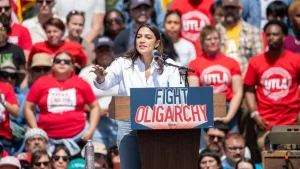The recent parliamentary confidence vote against German Chancellor Olaf Scholz, while unsuccessful in triggering his removal, has exposed deep fissures within the governing coalition and cast a shadow of uncertainty over the political landscape of Europe’s largest economy. The vote, initiated by the opposition, failed to secure the necessary majority for a successful ousting, but it nonetheless underscores the fragility of Scholz’s three-party coalition and highlights the growing discontent with his leadership amidst a backdrop of economic stagnation and mounting social anxieties. This political turbulence comes at a critical juncture for Germany, which is grappling with the fallout from the war in Ukraine, an energy crisis, and a looming recession. The vote’s outcome, while preserving Scholz’s chancellorship for now, leaves lingering questions about the government’s stability and ability to effectively address the pressing challenges facing the nation.
The confidence vote stemmed from a culmination of factors that have eroded public trust and fueled criticism of the government. The coalition, comprising the Social Democratic Party (SPD), the Greens, and the Free Democratic Party (FDP), has been plagued by internal disagreements and policy clashes, particularly on issues related to climate change, energy policy, and fiscal spending. The FDP’s resistance to certain green initiatives and its emphasis on fiscal conservatism have created friction with the Greens, leading to public spats and delays in policy implementation. Furthermore, the government’s response to the energy crisis, triggered by Russia’s invasion of Ukraine, has been perceived by some as insufficient, with concerns over rising energy prices and potential shortages adding to public unease. These internal divisions and perceived policy shortcomings have provided fodder for the opposition, who have seized upon the opportunity to portray the government as weak and ineffective.
The opposition’s strategy in calling for the confidence vote was twofold. Firstly, it aimed to expose the cracks within the governing coalition and further destabilize Scholz’s leadership. By forcing a public vote on the chancellor’s fitness to govern, the opposition sought to highlight the internal dissent and portray the government as incapable of providing stable leadership in challenging times. Secondly, the vote served as a platform for the opposition to showcase its own alternative vision and policy proposals. By articulating their critiques of the government’s performance and presenting their own solutions to the country’s problems, the opposition parties aimed to gain public support and position themselves as viable alternatives in future elections. While the confidence vote ultimately failed to remove Scholz, it nonetheless served as a significant political maneuver, allowing the opposition to capitalize on public anxieties and raise their own profile.
The outcome of the vote, while averting a full-blown government crisis, has left a palpable sense of uncertainty hanging over German politics. Although Scholz retained his chancellorship, the vote exposed the fragility of his coalition and the depth of dissatisfaction with his leadership. The narrow margin of victory suggests that Scholz’s grip on power is tenuous, and the ongoing internal divisions within the coalition raise concerns about the government’s ability to effectively govern and implement its agenda. The vote also underscores the growing polarization of German politics, with increasing public dissatisfaction with the established political order and a rise in support for populist and extremist parties. This polarization poses a significant challenge to the stability of German democracy and could further complicate efforts to address the country’s complex economic and social challenges.
The political turbulence in Germany has significant implications for Europe as a whole. As the continent’s largest economy and a key player in the European Union, Germany’s political stability is crucial for the region’s overall well-being. The current uncertainty surrounding the German government could hamper efforts to address pressing European challenges, such as the ongoing war in Ukraine, the energy crisis, and the economic slowdown. Germany’s leadership role within the EU is also at stake, as a weakened government may find it difficult to effectively advocate for its interests and contribute to shaping European policy. The political instability in Germany could also embolden populist and anti-EU forces in other member states, further fracturing the European project.
Looking ahead, the challenges facing the German government remain substantial. The coalition partners will need to find ways to bridge their differences and present a united front to address the pressing issues facing the country. Scholz will need to demonstrate stronger leadership and effectively communicate his vision for the future to regain public trust. The government will also need to address the underlying economic and social anxieties that are fueling public discontent, including rising inflation, energy insecurity, and social inequality. The success of the German government in navigating these challenges will have significant ramifications not only for Germany but also for the future of Europe. A stable and prosperous Germany is essential for a strong and united Europe, and the current political turbulence poses a significant test for the resilience of both the German political system and the European project.










